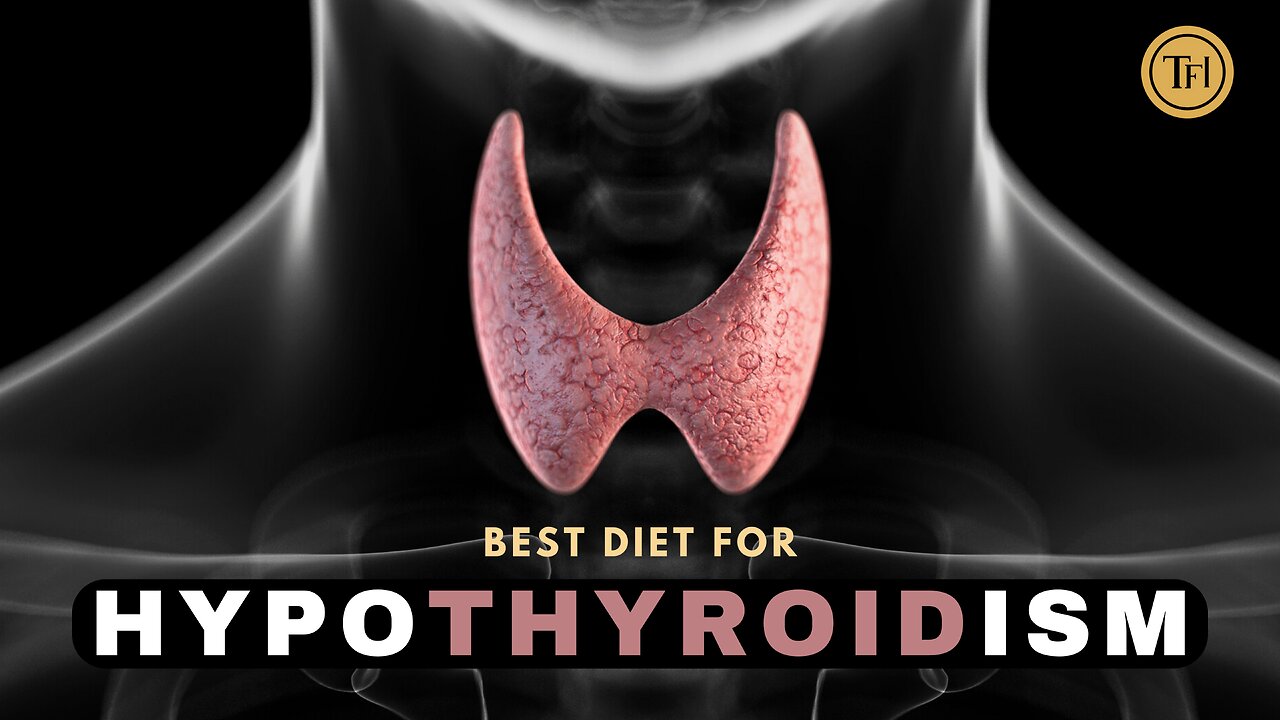Premium Only Content

Easy Natural Treatment for Thyroid | Hypothyroidism Foods to Incorporate and Avoid
Easy Natural Treatment for Thyroid | Hypothyroidism Foods to Incorporate and Avoid
The thyroid is a small, butterfly-shaped gland that impacts several significant functions of the body — regulating metabolism, digestion, body temperature, brain function and energy levels. But thyroid issues are common and, according to The American Thyroid Association (ATA), “up to 60 percent of those with thyroid disease are unaware of their condition.”
The thyroid and brain work synergistically, balancing and producing hormones to keep your body going. However, the thyroid is in a constant state of flux. Our environment — from stress and diet to genetics and underlying medical conditions — can affect how it functions.
Symptoms of thyroid problems
When the thyroid doesn’t function properly, it can cause a variety of symptoms and health concerns, including:
Fatigue. One of the most common symptoms of a malfunctioning thyroid is fatigue or loss in energy. Because the thyroid impacts every cell, tissue and organ in the body, if you’re feeling more tired than usual it might indicate a thyroid problem.
Heart palpitations. Thyroid dysfunctionality can either slow your heart rate or accelerate it. When it slows it can cause fatigue, and when it quickens it can cause a shortness of breath.
Swelling. As thyroid hormone slows or stills, so does cell health and reproduction — resulting in swelling in different parts of the body, most often the face.
Dry skin. When skin cell cycles are disrupted by a decrease in thyroid hormone release, skin cells can take longer to form, resulting in dryer skin.
Irregular periods. Menstrual irregularities include prolonged or unusually heavy periods.
Weight gain/loss. Thyroids help regulate metabolism, so when it makes less or more of its hormones, noticeable weight gain or loss could occur.
These and other symptoms could be signs of thyroid problems. Make sure to speak with a doctor to receive a valid diagnosis.
Ways to improve thyroid health
While you can’t control things like genetics or pre-existing conditions, there are still steps you can take to help improve your thyroid health:
Moderate stress. Increased stress can negatively affect your thyroid. Find ways to reduce stress (such as exercise and meditation).
Add selenium, iodine and zinc to your diet. Selenium is an important mineral that helps maintain your thyroid. It’s found in foods like eggs and legumes. Iodine is not naturally produced in the body, so it’s essential to have a diet containing it. Foods that contain iodine include fish, seaweed and eggs. Zinc is found in meat, poultry and whole grains. Take a daily multivitamin for extra coverage of these important minerals.
Get adequate sleep. Getting enough good quality sleep every night is essential to your overall health, but it is no less important when it comes to thyroid issues.
#thyroid
#hyperthyroid
#hyperthyroidism
#thyroidproblems
#thyroidawarenessmonth
#hypothyroidweightloss
#thyroidfood
#thyroiddiet
#thyroiddietplan
#informative
Follow us on:
Facebook: https://www.facebook.com/thefoodinterval
Twitter: https://twitter.com/thefoodinterval
Pinterest: https://www.pinterest.com/thefoodinterval/
Don't forget to subscribe on YouTube here: https://www.youtube.com/c/thefoodinterval?sub_confirmation=1
Join this channel to get access to perks:
https://www.youtube.com/channel/UCVoUu_KLzTNTHDQPbSB63qw/join
Medical disclaimer: The Food Interval does not provide medical advice. The content available in our books and videos, on our website, or on our social media handles do not provide a diagnosis or other recommendation for treatment and are not a substitute for the professional judgment of a healthcare professional in diagnosis and treatment of any person or animal. We intend to provide educational information only. The determination of the need for medical services and the types of healthcare to be provided to a patient are decisions that should be made only by a physician or other licensed health care provider. Always seek the advice of a physician or other qualified healthcare provider with any questions you have regarding a medical condition.
@TheFoodInterval
#thefoodinterval
-
 18:38
18:38
The Lou Holtz Show
15 hours agoLou Holtz: "Trump Stands for America—And He Means It!" | Ukraine, Pete Rose & Common Sense 🇺🇸
31 -
 3:54
3:54
Randi Hipper
15 hours ago$100,000 BITCOIN COMING! HERE'S WHY
130 -
 9:34
9:34
ariellescarcella
8 hours ago"Born This Way Is A Lie" : Religious Debate
41 -
 6:05:13
6:05:13
Akademiks
12 hours agoDay 1/30. Drake Drops lawsuit vs iHeartMedia? Offset and Cardi Calls it Quits. 50 v Jim Jones?
172K12 -
 2:55:11
2:55:11
TimcastIRL
9 hours agoDemocrat TANTRUM At Trump Speech BACKFIRES, Trump Polls UP, Dems UNDER FIRE w/67Kevin | Timcast IRL
188K84 -
 1:25:23
1:25:23
Kim Iversen
11 hours agoFrom Doctor to Political Prisoner: Dr. Simone Gold on COVID Lies, January 6th, and Medical Tyranny
106K57 -
 2:09:28
2:09:28
Melonie Mac
13 hours agoGo Boom Live Ep 39!
67.2K11 -
 1:04:36
1:04:36
Man in America
15 hours ago🚨 BREAKING: Dr. Robert Young JAILED! Medical Tyrants Will Do ANYTHING to Silence Truth
78.7K39 -
 3:01:44
3:01:44
I_Came_With_Fire_Podcast
12 hours agoPanama CANAL BlackROCKED | Left of PODCASTING | Ukraine AID GONE
43K8 -
 45:56
45:56
Glenn Greenwald
12 hours agoLee Fang Reacts to Trump's Speech to Congress; Will DOGE Tackle Military Waste? | SYSTEM UPDATE #418
123K98